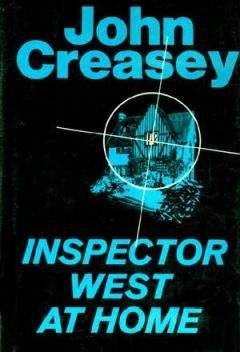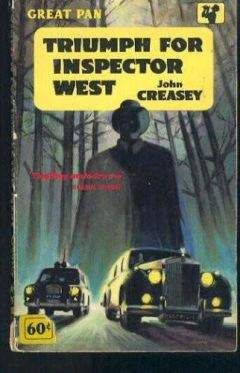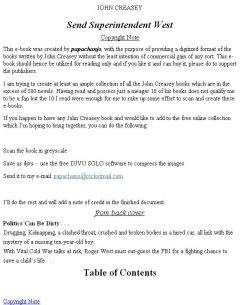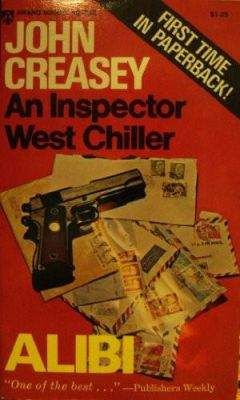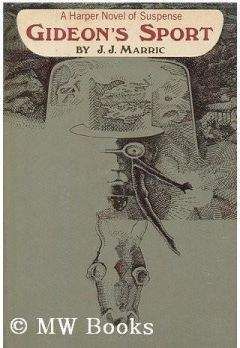John Creasey - Inspector West Alone
If he caught Sloan, what would Kennedy do?
Use the other Yard man? Or kill him?
Could Kennedy use Sloan successfully? Hadn’t he all that he wanted, already?
Roger stood up suddenly. “He’ll kill——” he began.
The door from the kitchen opened silently, and Harry came in with a tray.
“Did you speak, sir?” His sallow face was expressionless.
“Talking to myself. I’m too much on my own, Harry!”
“That has been my opinion for some time, if I may say so, sir.” Harry put down the tray, took a silver-plated lid off a dish of mixed grill. “That is the best I can do at such short notice, Mr. West.”
He drew back; his doleful brown eyes had an unusual glow. He seemed to come alive. And by saying “West” he had flung a verbal hand grenade.
Roger said slowly: “I don’t think I heard you.”
“I think you did, sir.”
Keep calm.
“How much do you know about this, Harry?”
“A little, sir.” He was solemn again, the glow had gone, but there was something in him which hadn’t been there before. “Also, I have had my instructions to report on your movements and your telephone calls while at the flat, sir. I have duly carried out my duties. Except——” he paused.
This was a form of torment. It was impossible to know what was in his mind; Roger felt as if he were in the midst of a furious explosion, but Harry’s voice was so quiet. He’d known the man for nearly two months, and studied him. All he’d seen was a well-trained automaton, obeying orders with smooth precision, never obtruding, always at hand.
Now, he was a man; a human being primed with dangerous knowledge.
“Except what?” Roger held the arms of his chair tightly.
Harry gulped; he had screwed himself up for this—yes, he was frightened. Tension, springing out of nowhere, was brittle and dangerous.
“When you went out the other night, sir.”
Roger didn’t speak, but thought of the dictaphone he knew was hidden in this room. He’d never located it; it had been wiser to leave it untouched, and guide all conversation into channels which Kennedy could safely hear. He couldn’t control this conversation.
“I saw the brown paper at the door, and that told me you had gone—I thought I heard you,” said Harry. “But I didn’t report to Mr. Briggs.”
“To whom?”
“Mr. Briggs—Percy, sir. Percy is the man to whom I have had to make all my reports.”
“I see. And why didn’t you inform him?”
“I weighed everything up and decided that it wouldn’t be in the best interests,” said Harry. He formed every word carefully, had to force it out, because of his fears. Of what? Of Roger’s reaction, when he knew the truth? Was this—blackmail? The word seemed to scream at Roger.
Harry was a crook, and must be a professional, or he wouldn’t have this job; Harry had a stranglehold over his “boss”. Roger stood quite still, watching his composure break now. The grill stood on the table, getting cold. Harry seemed to shrink, yet there was a form of courage in him. He licked his lips before he spoke again.
“You see, sir——”
No, he couldn’t get it out.
Roger said slowly, forcing down his rage. “All right, Harry. Let’s have it. How much do you want?”
Harry raised his hands, a swift, startled gesture. “Want? It’s not blackmail, I wouldn’t put on the black, it’s——”
The front-door bell rang.
CHAPTER XXI
INTO THE PARLOUR
HARRY jumped, as if someone had kicked him, and darted a glance over his shoulder.
Roger said: “Never mind that. If it’s not blackmail, what is it?”
“I—I think I had better see who that is,” said Harry. The ringing had made him turn pale, his hands weren’t steady. “It might be Mr. Briggs.”
Roger grabbed his arm.
“Forget it. What——”
Harry pulled himself free and hurried to the door. Short of grappling with him, which would probably be heard outside, there was nothing Roger could do. He watched the man’s thin back and sloping shoulders as he opened the door of the tiny hall. He heard the outer door ( opening. He looked round the room, in a despairing effort to locate the dictaphone; he was reduced to despairing efforts. He heard a man’s deep voice :
“All right, I know he’s in.”
It was Sloan.
“Really, sir.” Harry’s voice rose in. a protesting squeak. “Mr. Rayner is just having——”
Sloan filled the doorway.
Roger said evenly: “Getting tough?”
“I’m always tough when I’m in a hurry, and I’m in a hurry now. Is there a place where your man can go without hearing us?”
Harry’s eyes became cloudy again.
“Kitchen, Harry,” said Roger. He might have said: “Kennel, Fido,” and meant the same thing and had the same effect.
Harry went off, hurriedly, and closed the door leading to the kitchen. Sloan went across to it and turned the key in the lock. He looked very big, powerful, and aggressive.
Roger said: “I don’t know that I like you in this mood, Inspector.”
“Forget I’m a policeman. Did you telephone me on Sunday night?” Sloan was in an angrily aggressive mood.
There was a dictaphone, taking all this down.
“I did not.”
“I want the truth, Rayner.”
“Why don’t you ask your friend Kennedy?”
“Don’t be smart. After I came to see you, I was twice run down. Nearly run down. They were murder attempts. They came immediately after I’d called to see you. I’m giving you a chance to save yourself from trouble. Did you telephone me?”
“No.”
Sloan said: “So you fixed those attacks.”
“You’re crazy.”
“We’ll see.” Sloan moved across the room. He had his right hand in his pocket, holding something which made a considerable bulge; the kind of bulge that a gun would make. If a Yard man had reason to suspect that his life was in danger, he could get authority to carry a gun. There was something new in Sloan’s expression, as if he felt sure he could force a showdown, and meant to.
Roger said : “Calm down. Have a drink.”
“I’ve finished drinking with killers.”
“All right, please yourself. Mind if I get on with my supper?” Roger sat down and picked up a knife and fork.
“Where have you been to-night?”
“Out.”
“Don’t evade my questions. Where have you been?”
“Continuing my experiments in romance. Auburn, this time, and very sophisticated. I don’t think she would be quite your type.”
“Don’t you ? Not the type you had with you on Sunday night?”
An alarm bell seemed to ring in Roger’s head. He cut into a kidney and put it to his mouth; it wasn’t the easiest thing in the world to keep steady.
“No, not the same type at all. The first was a sweet little innocent animal, didn’t I tell you? There was nothing innocent about this one, and I don’t know that you could call her sweet.”
“What was the name of the girl you were out with on Sunday?”
“Doris.”
“Doris what?”
“That’s as far as was necessary.”
“Where did you take her?”
“I didn’t. She took me. A pleasant little two-roomed flat. She was very sweet.” He ate some bacon and toast; it nearly choked him.
“You’re lying. You took her out in a car.”
“Have it your own way.”
“The car was a Morris. Colour, grey. It was muddy because it had done a lot of country running and hadn’t been washed down. It’s still muddy. You took her out in it—let’s have the truth, Rayner.”
“I haven’t a car.”
“This one was lent to you.”
Roger finished his mouthful, and leaned back.
“I didn’t go out in any car on Sunday night. I spent the evening with Doris, and came back here in time to have a talk with you. Remember? If I wanted to hire a car, it wouldn’t be a poky Morris.”
Sloan took a step forward and grinned into his face.
“A poky Morris, is it? How did you know the size of that car, Mister Rayner.”
Roger would never feel contemptuous about a crook who made a simple slip again. But he laughed.
“When I think of Morris’s, I also think of size eights. I still wish that I knew what’s under your skin.”
Sloan said: “You will. We’ve picked up your Doris.”
“Really? What’s she done? I didn’t know that she was a crook in her spare time. I—oh, she’s a pro, is she ? Pity.”
“She’s a girl who lives on the fringe of a small East London gang. You know the gang—Myers runs it. She was in that muddy Morris outside Brixton Jail on Sunday night. You were with her.”
Roger said: “Well, well! Did she say so?”
“You were with her.”
“At her flat. If she’s said anything different, she was out with another man after I left her. That was quite early, remember. She——”
Sloan took out his gun—an automatic. He held it pointing towards Roger. He was a Scotland Yard Officer, and a Yard Officer never used a gun to threaten, or hardly ever. He used a gun in self-defence only, and there was no reason for self-defence here. Sloan was going too far, and the glitter in Sloan’s eyes suggested that he wasn’t himself. There was a dictaphone too, and it was at least possible that the watcher across the road had telephoned to report Sloan’s arrival. If so, others might come to collect the fly that had walked into Roger’s parlour.
“Let’s have the truth,” growled Sloan. “Go back a bit, Rayner. You killed West. All the rest is unimportant. You killed West. I may not be able to pin it on to you, but I’ve promised myself that I shall kill the man who killed West. I can shoot you in self-defence and get away with it.” His voice was low-pitched, he wasn’t so far beside himself that he risked Harry hearing the conversation. Could he mean this? Was it just bluff? All the experience of years told Roger that it was bluff, but he had never before seen Sloan in a savage, unreasoning mood like this. There was something more than the suspicion about the little grey car burning in Sloan.
Roger said: “I did not kill West. I have not killed anyone. I was not out in a grey Morris on Sunday night.”
“I don’t believe you.”
“All right, get on with your romancing. I’m hungry.” Roger turned to the mixed grill. It was cold, the fat had congealed on the plate. Sloan towered over him.
He said slowly, deliberately: “West’s body was found this morning. Until then, I wasn’t sure that he was dead. Now I know. Now I know that you killed him. But there are others, higher up than you. Kennedy—others. Let’s have the truth, Rayner. Give me the story, and the other names, and I’ll let you take your rap for the Brixton job and forget the rest. Keep it to yourself, and——”
He wasn’t even consistent.
Take it one at a time, and quickly. Kennedy’s sister had said that Janet could be “looked after” with a big insurance about which she had known nothing; that had been a strong hint that plans were in the making to produce his “body”. Sloan had jumped to the conclusions; but Sloan wasn’t in a normal mood.
Roger heard a car pull up, outside. Percy? Or men summoned by the man across the road?
“You can’t make me take a rap for a job I didn’t do,” he said. “You’ve got the wrong end of the stick, Sloan. Put that gun away and be sensible. How do you know your friend West is dead?”
“His body was found. He’d been drowned. Face battered, fingers amputated, all the usual tricks to prevent identification, but they made a mistake. You made a mistake. You fools always make one. West had a scar or two which served as identification. I saw the body myself. I’ve seen those scars myself. I’ve seen them before—I was with West when he was wounded, and got one of them.”
Brilliantly clever; they had even scarred a man, so that the identification would be to the satisfaction of the police. And Janet—did Janet know? He felt a desperate surge of anxiety, he had never been nearer telling Sloan the truth. But he daren’t, yet. He heard a sound, metal on metal; a key was being inserted in the lock of the outer door.
Sloan didn’t seem to hear it.
“I’m sorry about West,” Roger said. He felt sick—did Janet know? “If this girl Doris told you that I was with her in the car on Sunday night, she lied.”
Sloan thrust the gun forward.
“I’ll give you half a minute,” he said. His eyes glared, all finesse had gone, but even now it must be bluff.
The door of the hall opened softly. Sloan had his back to it.
“I mean it, Rayner.”
“Oh, no, you don’t.”
A man slid into the room, gun in hand, and spoke. Sloan spun round. The man at the door fired. The bullet smacked into Sloan’s gun and wrenched it out of his hand. It dropped to the floor, between him and the gunman, who moved forward swiftly and kicked it away. Two other men came in swiftly. Both had guns.
Sloan drew back. “Get out. Get——”
They approached, remorselessly.
Roger screwed himself up. If the order had gone out, “Kill Sloan”, then they’d shoot again, whether Sloan took this lying down, or put up a fight. But if they had orders to kill, would the man have shot the gun out of Sloan’s grasp? Wouldn’t he have killed him with that first shot?
Sloan said: “Get away.”
“Don’t try any rough stuff, Sloan,” said the man with the gun. He was small, thin, evil-faced: evil because of his grin. Roger knew him slightly, as one of the most corrupt and vicious East End gangsters, a race-gang type, and one of Oily Joe’s mob. His name was Myers. He took another step forward, the gun still raised.
A third man came in.
Sloan said : “Get—away.”
And then he jumped——
Roger shot out his foot. Sloan kicked against it and went sprawling as the gunman squeezed the trigger. The bullet spat out, the sharp crack echoed. The bullet buried itself in the wall, and Sloan sprawled forward, unhurt. The two men from “behind the gunman pounced; wolves couldn’t have moved quicker. Before Sloan could save himself, he was manacled with regulation handcuffs.
Sloan suddenly became still.
Myers grinned at Roger. “Saved a lot o’ trouble, ain’t it? Okay, get him out.” He nodded to the others, who dragged Sloan towards the door, and at the doorway hoisted him between them so that they could carry him downstairs. He disappeared, and he was alive: they’d gone to a lot of trouble to keep him alive.
The thin-faced man said : “All okay?”
“That made a lot of noise,” Roger said.
“Nice and quiet up here. You don’t have to worry. If anyfink was ‘eard, we’ll fix it. So long.” Myers swaggered out of the room and closed the door behind him. The footsteps on the stairs sounded loud as the other men carried Sloan.
* * * *
He didn’t know how long he sat there before he heard the tapping. At first, he hardly noticed it, but it continued so persistently that he raised his head and looked about him. It came from the kitchen door—Harry, of course. He had forgotten Harry, forgotten his urgency when Harry had gone to open the door to let Sloan in.
